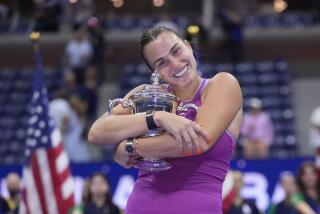Capriati Falls Out of Favor in Paris
- Share via
PARIS — The shift from underdog to favorite has rarely been smooth for Jennifer Capriati.
Capriati and the word “favorite” formed an uneasy alliance at the French Open after the surprising departures of Venus and Serena Williams and Amelie Mauresmo of France. There should have been a warning offered her Thursday: Front-run at your own peril.
Once the underdog tag was eliminated, so was Capriati.
Sixth-seeded Anastasia Myskina defeated seventh-seeded Capriati in decisive fashion, 6-2, 6-2, in 1 hour 1 minute in the semifinals, a victory that set up another historic moment in the women’s final. A year after staging the first all-Belgian Grand Slam final, between Justine Henin-Hardenne and Kim Clijsters, the French Open will have the first all-Russian Grand Slam women’s final.
Myskina’s childhood friend and onetime fellow Moscow Spartak club member, No. 9 Elena Dementieva of Russia, landed first, beating No. 14 Paola Suarez of Argentina, 6-0, 7-5, in the earlier semifinal.
Dementieva had a feeling she would be facing her countrywoman, offering a prediction and joking about a change of venue.
“I think it’s going to be a Russian final,” she said. “You know, we’re not going to play, we’ll just take the trophy and come back to Moscow, and we’re going to play there.”
Dementieva is coached by Olga Morozova, the first Russian woman to reach a Slam final, having lost to Chris Evert here and at Wimbledon in 1974.
The energetic Morozova was thrilled that the moment for Russian women had finally arrived.
“Let’s put it this way, you were writing, ‘The Russians are coming!’ for how many years?” she said, smiling. “OK, finally, you ask, we deliver.”
Morozova spoke for a few minutes with reporters, then spotted Myskina nearby in the players’ lounge, politely excused herself and warmly congratulated Myskina.
Capriati’s camp was considerably more subdued after her shockingly poor performance, littered with 36 unforced errors and marred by a forehand gone missing.
It was only her second loss to Myskina in seven matches, and a few short weeks ago, she’d beaten the Russian decisively on clay in Berlin. The difference was that Capriati wasn’t coming off such an emotional victory over Serena Williams. Her quarterfinal triumph Tuesday apparently produced too much expectation. Suddenly, Capriati, a three-time Slam champion, including the 2001 title here, was favored against Myskina, who was in her first semifinal of a major and had never been past the second round at Roland Garros.
“Maybe it was just too much excitement, too much hype for that match,” Capriati said. “I couldn’t focus on the next one. You know, everyone just talking about it too much and it’s only the quarterfinals. So maybe it was just, I didn’t have much time to really concentrate on it.”
That seemed evident as she fell behind, 0-3, in the first 16 minutes, committing 15 unforced errors. That wasn’t going to get the job done against Myskina. Capriati played a bit better in the second set and had two break points at 2-2 but squandered them both, hitting a forehand long and netting a forehand return.
Capriati’s service return was especially dreadful. She simply could not cope with Myskina’s change of pace.
“I was expecting Myskina to come out and play the normal game,” Capriati said. “But ... she’s hitting serves, like, 50 miles an hour, and then usually I should be able to take those shots and hit winners or do something. Just nothing was going in.”
Morozova noted a common thread of erratic play among the final four.
“They all were tight,” she said. “Tell me, who didn’t have a difficult match? Myskina had to go three against Svetlana [Kuznetsova]. All of them had difficulty -- except maybe Suarez.”
And Suarez was overmatched in her first Slam semifinal. She didn’t have the weapons to challenge Dementieva, and didn’t serve particularly well. Suarez and Dementieva combined for 69 unforced errors and 17 double faults. Dementieva, who had nine, luckily did not have to serve for a spot in the final, winning it when Suarez double-faulted on match point.
“Yes, obviously, I’m rather angry,” Suarez said in the Spanish portion of her news conference. “I’m really angry, actually.”
Roland Garros has not been the best advertisement for the stars of women’s tennis, who have seriously under-performed here. Former No. 1 Martina Hingis of Switzerland, who remains retired and is here commenting on TV for Eurosport, spoke about the physical side overtaking the mental aspect of the sport.
So was it difficult to be brutally candid about the lousy semifinals?
Hingis laughed, saying, “I’ve always been a nice girl. I don’t want them to be my enemies.”
But ... she couldn’t help being honest, discussing the power game and its drawbacks with American TV commentator Mary Carillo and a couple of reporters after the second semifinal.
“It’s a different generation out there,” Hingis said. “It’s gotten so physical. No one uses their hands anymore. It’s about overpowering the other.... Patience is gone.”
More to Read
Go beyond the scoreboard
Get the latest on L.A.'s teams in the daily Sports Report newsletter.
You may occasionally receive promotional content from the Los Angeles Times.











